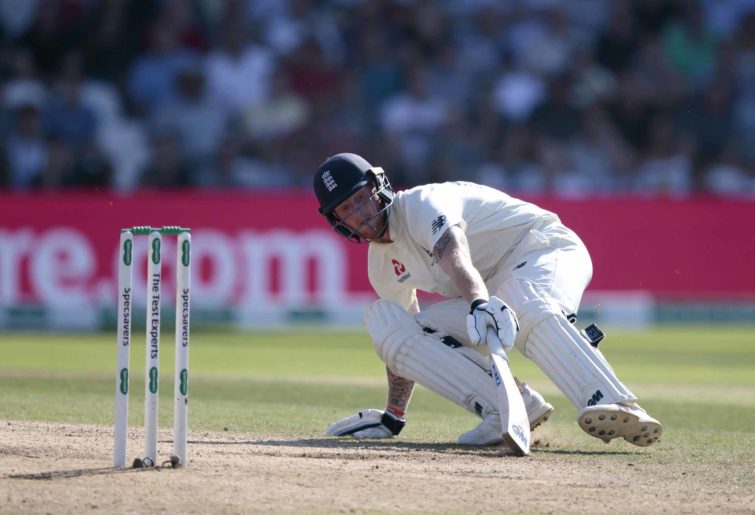Bazball comes first over hit and giggle: Stokes pulls out of T20 World Cup to focus on Tests
England's chances of retaining the Twenty20 World Cup have been hit for six with the news Ben Stokes has opted out of selection for…
In the moments after Ben Stokes’ Headingley miracle, asterisks were already forming in the minds of cricket’s more pedantic observers.
“Ah yes, bravo Ben. Fine innings. Capital. But you rather got away with that leg before, didn’t you old bean?” These were the likely thoughts of some of the MCC’s more Bertie Wooster-esque members.
Australian fans would undoubtedly have been less hesitant. Had they been given the chance to speak to Stokes directly, many would have been eager to tell him, “Mate, you were actually bloody out.”
Life isn’t fair, and nor is cricket. The fact that ball-tracking technology projected the final delivery of Nathan Lyon’s final over – which smacked Stokes on the pads – to be cannoning into the stumps may well have been a worthy talking point.
But the fact that umpire Joel Wilson turned down the appeal, and the fact that Tim Paine could not challenge the decision because he had squandered his side’s reviews were – in the end – the only things that mattered.
For some Australian fans, replays of that Lyon delivery quickly started to possess a therapeutic value. The footage loomed like a grievance to be clutched onto, providing instant justification for gripes about how England had – in the words of Justin Langer – “stolen” another undeserved victory.

(AP Photo/Jon Super)
It was much easier to blame the umpire than Lyon himself – even though his vaudevillian fumble of the ball that gave the tenacious Leach a vital reprieve was equally to blame for Australia’s defeat.
Perhaps because cricket is so rich in statistics – and is popular with those who possess analytical temperaments – it can at times encourage obsessive kinds of thinking.
Pundits can ruminate too deeply on the game’s counterfactuals and can place an unhealthy emphasis on its fine margins. The phrase ‘it’s not cricket’ tends to encourage an understanding of right and wrong that is legalistic, rather than moralistic.
As a result of all this, there is a temptation to let memories of umpiring errors linger a little too long.
The fact is that mistakes by umpires have been part of cricket for centuries. They have decided the outcomes of matches and changed the course of a series. But only on rare occasions have they threatened to become scandals.
When the Indian team complained in the wake of the now infamous 2008 SCG Test because Andrew Symonds nicked the ball but didn’t walk – and went onto make a decisive 162 not out – they conveniently overlooked the fact that other umpiring mistakes in that match had favoured them.
Symonds’ innings was unfairly demonised because he had done what most professional cricketers would do – wait for the umpire to give him out.
For a batsman to be dismissed, cricket’s laws insist that an appeal is made. Umpires lack the benefit of replays, and rely exclusively on first impressions.
What constitutes being out is therefore a matter of perception. As Dennis Denuto would have understood, there is a ‘vibe’ involved. Batsmen who inside edge onto their pads no doubt feel aggrieved if they are wrongly given out LBW – but perhaps they should reconsider. After all, they have still erred in not middling the ball.
During his radio commentary, Glenn McGrath described Wilson’s decision as “horrible” and “very poor”. Not only were McGrath’s comments unfair, they were only made after he had watched a replay.
To the naked eye, it was easy to see why Wilson assumed the ball was missing the stumps. Stokes’s stance suggested his pads were further to the onside than actually was the case. It was only with hindsight and the benefit of a slow motion replay that the decision became a howler. In years gone by – before the advent of ball-tracking technology – this decision would not have been questioned.
That is not to say that the DRS has not improved the game. In my view, it has done so immeasurably. But the DRS is nevertheless a compromise between cricket’s traditions and scientific exactitude.
As a wise man once said – if there is more than one way of doing something, then none of them are perfect. As long as the human factor remains – and it should remain – decisions like Wilson’s will continue to stand.
From an objective observer’s perspective, Wilson’s decision was not just better for England. It was better for the series, for the Ashes and for Test cricket.

(Gareth Copley/Getty Images)
From the point of view of some English fans, the LBW did not tarnish the result – it made it better. Once the appeal was turned down, some of the rowdier, more vengeful supporters were probably hoping replays would show the ball hitting the stumps, to serve the Australians right for wasting their reviews.
The final moments of the Headingley Test were a stunning example of fortune favouring the brave. Leach lived up to his name, draining the life and hope out of his hapless opponents.
Some will seek to ensure a pall of controversy hangs over the Headingley Test. But Stokes’ innings – like that of Symonds in 2008 – does not deserve a black mark next to it.
Gladly – unless denoting a batsman’s unbeaten innings – asterisks don’t make their way into cricket’s scorecards. Stokes’s not out knock of 135 will rightly go down in cricket history as one of the finest, most extraordinary feats of match-winning power hitting under pressure.
As a dazed Alastair Cook reflected in those magical moments after the end of the game, “that is the most extraordinary innings ever, ever to have been played by an Englishman.”